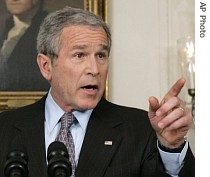2007年VOA标准英语-US, South Korea Agree on Trade Liberalization D(在线收听)
Seoul
02 April 2007
U.S. and South Korean negotiators have sealed one of the world's largest two-nation free trade agreements. If the deal can overcome hurdles on the legislative front, it may dramatically increase trade between the two economies. VOA Seoul Correspondent Kurt Achin has more.
South Korean President Roh Moo-hyun struck a supportive, but apologetic tone in justifying his nation's free trade agreement with the United States.
In a nationwide television address, Mr. Roh said he knew some people would be hurt by the agreement. But he pledged government support in making South Korea's adjustment to further market opening less painful.
The announcement of the trade opening deal follows 10 months of negotiations, capped off by three days of around-the-clock talks on the most sensitive issues.
U.S. senior negotiator Wendy Cutler says the resulting deal has been worth the effort.
"I give it an 'A' plus," she said. "I think it is a high quality agreement, yet it is extremely balanced."
Negotiators have not yet revealed full details of the agreement, but say it reduces or removes tariffs on products ranging from food to automobiles and financial services.
But South Korean Trade Minister Kim Hyun-jung told reporters Seoul insisted on keeping certain trade protections in place.
Kim says because the concerns of the South Korean people are so strong, Seoul's negotiators kept their promise to exclude the country's rice market from the agreement.
Rice production is viewed as a traditional part of Korean culture, and is a strong rallying point for frequent demonstrations against the agreement.
In one unusually dramatic illustration of that opposition, a South Korean man set himself on fire Saturday in protest of the trade talks. He is being treated for third degree burns.
Negotiators say the deal makes progress in offering U.S. companies the kind of access they have wanted to the South Korean automobile and financial services markets. U.S. automakers have accused Seoul of using arbitrary rules as a means of suppressing imports.
 |
| George W. Bush |
The president of South Korea's American Chamber of Commerce, Tami Overby, says the deal has a good chance of political survival.
"It has got to pass [South Korea's] National Assembly and it has got to pass Congress, and from everything we have seen - it is still early days and we have not seen all the details - but it looks good," he said.
Experts say the legislative process could take months, but will probably be completed during the Bush Administration.